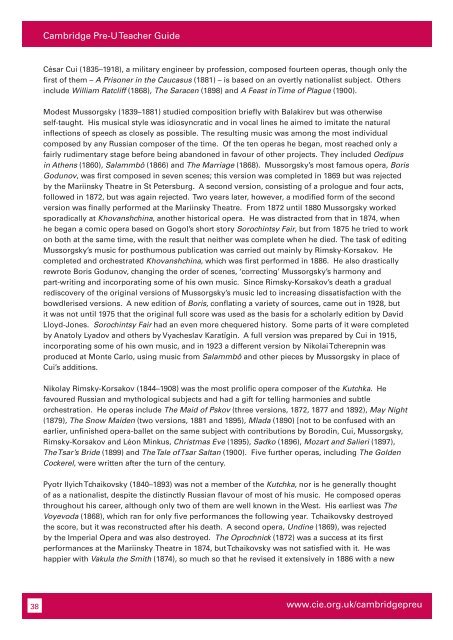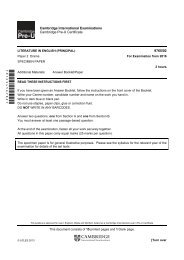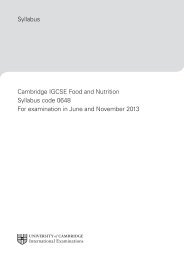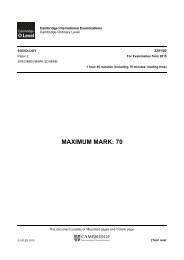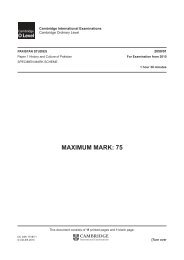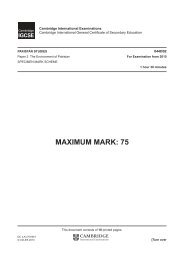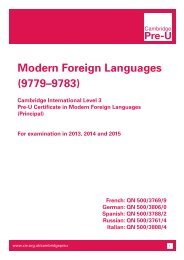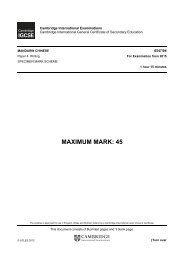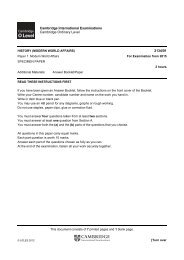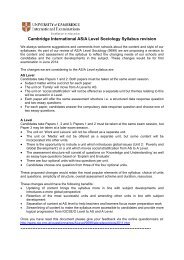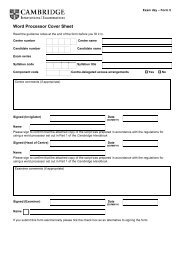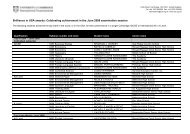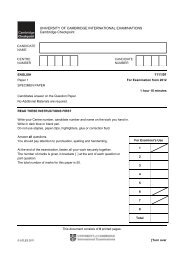Teacher's Guide Cambridge Pre-U MUSIC Available for teaching ...
Teacher's Guide Cambridge Pre-U MUSIC Available for teaching ...
Teacher's Guide Cambridge Pre-U MUSIC Available for teaching ...
You also want an ePaper? Increase the reach of your titles
YUMPU automatically turns print PDFs into web optimized ePapers that Google loves.
38<br />
<strong>Cambridge</strong> <strong>Pre</strong>-U Teacher <strong>Guide</strong><br />
César Cui (1835–1918), a military engineer by profession, composed fourteen operas, though only the<br />
first of them – A Prisoner in the Caucasus (1881) – is based on an overtly nationalist subject. Others<br />
include William Ratcliff (1868), The Saracen (1898) and A Feast in Time of Plague (1900).<br />
Modest Mussorgsky (1839–1881) studied composition briefly with Balakirev but was otherwise<br />
self-taught. His musical style was idiosyncratic and in vocal lines he aimed to imitate the natural<br />
inflections of speech as closely as possible. The resulting music was among the most individual<br />
composed by any Russian composer of the time. Of the ten operas he began, most reached only a<br />
fairly rudimentary stage be<strong>for</strong>e being abandoned in favour of other projects. They included Oedipus<br />
in Athens (1860), Salammbô (1866) and The Marriage (1868). Mussorgsky’s most famous opera, Boris<br />
Godunov, was first composed in seven scenes; this version was completed in 1869 but was rejected<br />
by the Mariinsky Theatre in St Petersburg. A second version, consisting of a prologue and four acts,<br />
followed in 1872, but was again rejected. Two years later, however, a modified <strong>for</strong>m of the second<br />
version was finally per<strong>for</strong>med at the Mariinsky Theatre. From 1872 until 1880 Mussorgsky worked<br />
sporadically at Khovanshchina, another historical opera. He was distracted from that in 1874, when<br />
he began a comic opera based on Gogol’s short story Sorochintsy Fair, but from 1875 he tried to work<br />
on both at the same time, with the result that neither was complete when he died. The task of editing<br />
Mussorgsky’s music <strong>for</strong> posthumous publication was carried out mainly by Rimsky-Korsakov. He<br />
completed and orchestrated Khovanshchina, which was first per<strong>for</strong>med in 1886. He also drastically<br />
rewrote Boris Godunov, changing the order of scenes, ‘correcting’ Mussorgsky’s harmony and<br />
part-writing and incorporating some of his own music. Since Rimsky-Korsakov’s death a gradual<br />
rediscovery of the original versions of Mussorgsky’s music led to increasing dissatisfaction with the<br />
bowdlerised versions. A new edition of Boris, conflating a variety of sources, came out in 1928, but<br />
it was not until 1975 that the original full score was used as the basis <strong>for</strong> a scholarly edition by David<br />
Lloyd-Jones. Sorochintsy Fair had an even more chequered history. Some parts of it were completed<br />
by Anatoly Lyadov and others by Vyacheslav Karatïgin. A full version was prepared by Cui in 1915,<br />
incorporating some of his own music, and in 1923 a different version by Nikolai Tcherepnin was<br />
produced at Monte Carlo, using music from Salammbô and other pieces by Mussorgsky in place of<br />
Cui’s additions.<br />
Nikolay Rimsky-Korsakov (1844–1908) was the most prolific opera composer of the Kutchka. He<br />
favoured Russian and mythological subjects and had a gift <strong>for</strong> telling harmonies and subtle<br />
orchestration. He operas include The Maid of Pskov (three versions, 1872, 1877 and 1892), May Night<br />
(1879), The Snow Maiden (two versions, 1881 and 1895), Mlada (1890) [not to be confused with an<br />
earlier, unfinished opera-ballet on the same subject with contributions by Borodin, Cui, Mussorgsky,<br />
Rimsky-Korsakov and Léon Minkus, Christmas Eve (1895), Sadko (1896), Mozart and Salieri (1897),<br />
The Tsar’s Bride (1899) and The Tale of Tsar Saltan (1900). Five further operas, including The Golden<br />
Cockerel, were written after the turn of the century.<br />
Pyotr Ilyich Tchaikovsky (1840–1893) was not a member of the Kutchka, nor is he generally thought<br />
of as a nationalist, despite the distinctly Russian flavour of most of his music. He composed operas<br />
throughout his career, although only two of them are well known in the West. His earliest was The<br />
Voyevoda (1868), which ran <strong>for</strong> only five per<strong>for</strong>mances the following year. Tchaikovsky destroyed<br />
the score, but it was reconstructed after his death. A second opera, Undine (1869), was rejected<br />
by the Imperial Opera and was also destroyed. The Oprochnick (1872) was a success at its first<br />
per<strong>for</strong>mances at the Mariinsky Theatre in 1874, but Tchaikovsky was not satisfied with it. He was<br />
happier with Vakula the Smith (1874), so much so that he revised it extensively in 1886 with a new<br />
www.cie.org.uk/cambridgepreu


